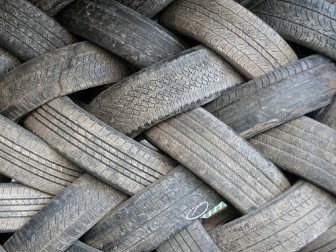
Using the material from recycled tires could cut down on road repairs and tire disposal issues. Photo: Mykl Roventine/Flickr CC.
By Ashley Weigel
Capital News Service
Old tires may pave the way for new Michigan road repairs.
Gov. Rick Snyder proposed spending $1.3 billion on road repairs in his first State of the State Address in 2011. So far, no one has found that kind of funding.
But the Muskegon County Road Commission and other groups are investigating how to more cheaply fix Michigan roads with tires in a way that benefits the entire state.
The advantages: repairs can be cheaper, make roads more pothole-resistant and help the state get rid of a tire disposal headache.
The Muskegon County Road Commission won a $327,513 grant from the Michigan Department of Environmental Quality’s scrap tire market development grant to explore the solution.
About 11 million tires are discarded annually in Michigan, said Karen Tommasulo, the state agency’s public information officer. Used tires can only be disposed of at licensed disposal areas. In 2004 the state banned whole tires from landfills.
Discarded tires can catch fire, releasing chemicals that contaminate the air, soil and groundwater, according to the U. S. Environmental Protection Agency. The state agency is trying to reduce tires sitting in disposal sites to avoid environmental harm.
The road commission plans to use about 6,800 tires in rubber-modified asphalt to repave a road in Moorland Township. The grant covers half of the project’s cost.
About 3.1 miles of Goebel Road will be repaved with a mix of rubber from recycled tires and hot, liquid asphalt. The county’s highway engineer, Paul Bouman, hopes that will make a stronger, more durable road and reduce maintenance costs.
We are “getting our feet wet in this technology, trying to help get the technology out there for the industry,” he said.
And he is hopeful this could be a solution for other places too.
“We would anticipate, if this goes well, we’ll try to expand what we’ve learned here and go forward,” Bouman said.
The rubber in the new asphalt adds elasticity to the roads, which makes them more flexible during the freeze and thaw cycles, said Michael Marshall, Scrap Tire Program coordinator for the DEQ. The elasticity prevents cracks that can allow water to seep in and ruin the road.
Rubber-modified asphalt is cheaper to use because less asphalt is needed to repave roads than with regular asphalt. It also reduces maintenance costs long term because of the increased durability of the roads.
Other road departments, including those in Saginaw and Ingham counties, and Michigan State University, have also been awarded grants in the last few years, each using the new asphalt to upgrade roads in their counties.
“A road is an asset, you have to manage it to get full value of the asset,” Bouman said.
About 87 percent of state highways were in good or fair condition in 2012, according to the Michigan Department of Transportation. An average of $917 million is needed each year to keep the conditions at good or fair.